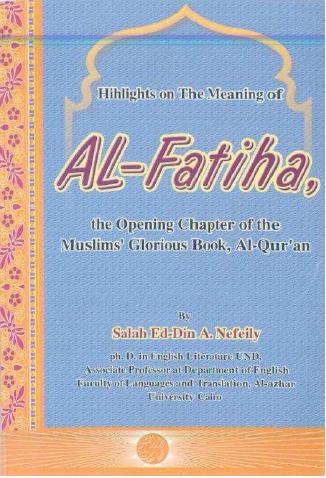Highlights On the meaning of Al-Fatiha

Verse Four:
مَلِكِ يَوْمِ الدِّينِ {الفاتحة/4}
"Master and Possessor of the Day of Judgment."
The word /maaliki/ which means 'possessor' in Arabic is read by some
readers of the Qur'an as /maliki/ to mean "king" of the Day of
Judgment. However, both readings are acceptable. The meaning of the word as 'possessor'
is said to be more effective than the meaning of the word as 'king' a possessor
has direct right to the thing possessed whereas a king is like a protector of
such things and of peace among possessors in his kingdom. On the other hand, it
is said that a king has more power than a possessor. Hence, the two readings
are acceptable. It is better to think 0f Allah as both the only king and the
sole possessor of the Day of Judgment. On that day, Allah will ask: "Who
is then the Lord?" The answer will then come from Him "Allah is the
only Lord". When a sinner knows that there is punishment on the Day of
Judgment, he will correct himself in this life. A good person will be encouraged
to act properly when he knows that he will be rewarded on the Day of Judgment.
Such an observation of Allah's mercy and power is more effective than the
secular system in which a person fears the legal punishment and is ready to
make mistakes in the absence of the law. A Muslim realizes that Allah knows all
about him for He is the Omniscient Qur’an
58: 7).
إِنَّ اللَّهَ بِكُلِّ شَيْءٍ عَلِيمٌ {المجادلة/7}
Though Allah is the 'Ever Possessor' of all the worlds, yet He mentions
His possession of the Day of Judgment specifically because of its magnitude and
because He is the Sole Possessor of that Day. The horror Of the Day of Judgment
is referred to in many verses in different suras of the Qur'an. In Sura 22, for
example, the first two verses read:
O Mankind, fear your Lord and be dutiful to Him! Verily, the earthquake
of the Hour of Judgment is a terrible thing. The Day you shall see it, every
nursing mother will forget her nursling and every pregnant one will drop her
load, and you shall see mankind as in a drunken state, yet they will not be
drunken, but severe will be the [situation with sinners].
A Muslim's belief in the Day of Judgment and his fear of punishment free
him of enslavement to his own desire to sin. He knows that he will be held
responsible for his deeds. This belief will also free him of enslavement to
others. He will know that this short life is incomparable with the everlasting
one that follows resurrection. He will then be in control of his wishes and desires.
He will be ready to sacrifice the pleasures of this life for the happiness and
pleasures of the everlasting life thereafter. He will not kill, nor steal nor
commit adultery for fear of punishment on the Day of Judgment. Such an attitude
will establish peace and safety in the world.
